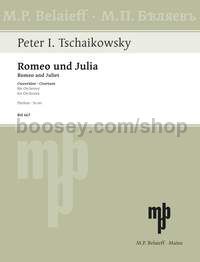Romeo and Juliet - Overture - orchestra (score)
Romeo and Juliet - Overture - orchestra (score)
* Estimated price converted from UK retail price
Peter Tchaikovsky based the fantasy overture Romeo and Juliet, which he composed in October and November 1869, on Shakespeare's tragedy of the same name. The idea of the work had been suggested to him by Mili Balakirev. The first performance of the overture in Moscow on 4 March 1870 at the Eighth Symphony Concert of the Russian Musical Society was conducted by Nikolai Rubinstein. After the performance Mili Balakirev criticized certain aspects of the work, an thus, in the summer of 1870, Tchaikovsky produced a revised version in which he made certain changes and added new material. The performances of this version of the overture in St Petersburg on 5 February 1872 at the Fourth Symphony Concert of the Russian Musical Society were conducted by Eduard Nápravnik and Nikolai Rubinstein respectively. The overture was not heard again for quite a long time after these two performances. In the summer of 1880 Tchaikovsky once again revised the work, making changes to part of the recapitulation section and the ending. The performances of the final version of the overture in Tbilisi on 19 April 1886 at the Extraordinary Symphony Concert of the Russian Musical Society and in St Petersburg on 28 February 1887 were conducted by Mikhail Ippolitov-Ivanov and Eduard Nápravnik respectively. The main themes are the same in all three versions. The second version consists of 197 bars from the first version and 342 bars of new material. 34 additional bars constitute the only difference between the second and the third versions. The present edition, prepared by the Russian composer and musicologist Viktor Ekimovsky, is based on earlier publications and contains editorial comments with regard to printing errors and slips of the composer's pen.




